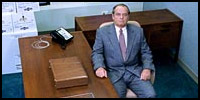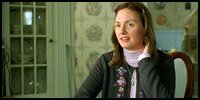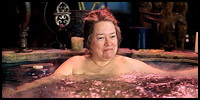
 |
About Schmidt (2002) Directed by Alexander Payne Cast: Jack Nicholson, Hope Davis, Kathy Bates, Dermot Mulroney, June Squibb, Howard Hessman, Len Cariou, Harry Groener, Connie Ray, Mark Venhuizen, Cheryl Hamada, Matt Winston, Phil Reeves 2002 – 125 minutes Rated: Reviewed by Dustin Putman, December 26, 2002.  "About Schmidt" is, in essence, about a soft-spoken, recently retired 66-year-old named Warren Schmidt (Jack Nicholson) who comes to the frightening realization that his entire life has been meaningless. Once he dies, and everyone he knows has died, it will be as if he never even existed. And, most shattering of all, the world will go on just as it always has, with the mark he attempted to make while on Earth permanently erased.
"About Schmidt" is, in essence, about a soft-spoken, recently retired 66-year-old named Warren Schmidt (Jack Nicholson) who comes to the frightening realization that his entire life has been meaningless. Once he dies, and everyone he knows has died, it will be as if he never even existed. And, most shattering of all, the world will go on just as it always has, with the mark he attempted to make while on Earth permanently erased.
 Amazing, how such grim subject matter could produce so many big laughs. Directed by Alexander Payne (1999's "Election"), he is remarkable at finding genuine humor and universal human truths out of even the most downbeat situations. "About Schmidt" is not depressing, because no well-made movie could ever hold such a dubious characteristic, but the themes it deals with very much are. At the same time, it achieves a sheer comic mastery through its tonally exquisite screenplay (by Payne and Jim Taylor) and a performance from Jack Nicholson (2001's "The Pledge") as accomplished as any he has given.
Amazing, how such grim subject matter could produce so many big laughs. Directed by Alexander Payne (1999's "Election"), he is remarkable at finding genuine humor and universal human truths out of even the most downbeat situations. "About Schmidt" is not depressing, because no well-made movie could ever hold such a dubious characteristic, but the themes it deals with very much are. At the same time, it achieves a sheer comic mastery through its tonally exquisite screenplay (by Payne and Jim Taylor) and a performance from Jack Nicholson (2001's "The Pledge") as accomplished as any he has given.
 Following his retirement, Omaha native Warren Schmidt prepares to settle down with Helen (June Squibb), his wife of 42 years, even as he looks at her day in and day out wondering "who is this old woman sleeping in my bed." When Helen suddenly dies, Warren finds himself alone, unable to adjust to not being taken care of. To vent his frustrations, he adopts a 6-year-old Tanzanian boy named Ndugu from a "Save the Children" infomercial and begins writing him blindingly honest letters about his regrets, fears, and failures in life. With his grown daughter Jeannie's (Hope Davis) impending wedding to the questionably oily Randall (Dermot Mulroney) approaching, Warren sets out on the open road in his new RV to see the world and figure out where he belongs in it. His final stop is in Denver, where he plans to stop Jeannie from making what he believes to be a life-altering mistake.
Following his retirement, Omaha native Warren Schmidt prepares to settle down with Helen (June Squibb), his wife of 42 years, even as he looks at her day in and day out wondering "who is this old woman sleeping in my bed." When Helen suddenly dies, Warren finds himself alone, unable to adjust to not being taken care of. To vent his frustrations, he adopts a 6-year-old Tanzanian boy named Ndugu from a "Save the Children" infomercial and begins writing him blindingly honest letters about his regrets, fears, and failures in life. With his grown daughter Jeannie's (Hope Davis) impending wedding to the questionably oily Randall (Dermot Mulroney) approaching, Warren sets out on the open road in his new RV to see the world and figure out where he belongs in it. His final stop is in Denver, where he plans to stop Jeannie from making what he believes to be a life-altering mistake.
 For all of his past critical accolades, Jack Nicholson could be accused of playing the same character—one not far from his own extroverted, tell-it-like-it-is persona. Not here. In portraying the self-destructing, desperately sad Warren Schmidt, Nicholson has created a sympathetic, three-dimensional character from the feet up. Watch him throughout the movie; he says very little (most of which comes in voiceover as he writes letters to Ndugu), but all one needs to know about him is written on his face.
For all of his past critical accolades, Jack Nicholson could be accused of playing the same character—one not far from his own extroverted, tell-it-like-it-is persona. Not here. In portraying the self-destructing, desperately sad Warren Schmidt, Nicholson has created a sympathetic, three-dimensional character from the feet up. Watch him throughout the movie; he says very little (most of which comes in voiceover as he writes letters to Ndugu), but all one needs to know about him is written on his face.
 When Warren finally reaches Denver, he is given a place to stay at Randall's mother Roberta's house. As played deliciously and unselfconsciously by Kathy Bates (2002's "Dragonfly"), Roberta is everything Warren is not: outgoing, shameless, and unabashedly forthright. Bates threatens to steal every one of her scenes. Hope Davis (2001's "Hearts in Atlantis") also turns in strong work as Jeannie, a woman torn between making her own decisions in life and respecting her father's opinions.
When Warren finally reaches Denver, he is given a place to stay at Randall's mother Roberta's house. As played deliciously and unselfconsciously by Kathy Bates (2002's "Dragonfly"), Roberta is everything Warren is not: outgoing, shameless, and unabashedly forthright. Bates threatens to steal every one of her scenes. Hope Davis (2001's "Hearts in Atlantis") also turns in strong work as Jeannie, a woman torn between making her own decisions in life and respecting her father's opinions.
 In telling a story about hopelessness, director Alexander Payne offers up small moments of beauty that do not mean a lot in the grand scheme, but do to Warren. Even as he mourns his fading vitality, he finds unexpected pleasure visiting random roadside attractions and museums to which he never typically would have given a second thought. The final shot of "About Schmidt" is its best. Just as things can't seem to get any bleaker, a sign of unexpected hope arrives, finally bringing all of Warren's bottled-up emotions to the surface. That a film such as "About Schmidt" can be so dark and yet so funny, so poignant and yet so uplifting, is something of a miracle.
In telling a story about hopelessness, director Alexander Payne offers up small moments of beauty that do not mean a lot in the grand scheme, but do to Warren. Even as he mourns his fading vitality, he finds unexpected pleasure visiting random roadside attractions and museums to which he never typically would have given a second thought. The final shot of "About Schmidt" is its best. Just as things can't seem to get any bleaker, a sign of unexpected hope arrives, finally bringing all of Warren's bottled-up emotions to the surface. That a film such as "About Schmidt" can be so dark and yet so funny, so poignant and yet so uplifting, is something of a miracle.
©2002 by Dustin Putman |
 |













